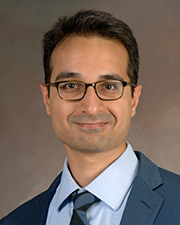Neurology project takes AHA/ASA Stroke Data Challenge prize

A paper from the team of Amanda Jagolino-Cole, MD, associate professor; Sushanth Aroor, MD, assistant professor; Anjail Sharrief, MD, MPH, professor; and Sunil Sheth, MD, associate professor in the Department of Neurology, won the 3rd Place Prize in the American Heart Association/American Stroke Association Stroke Data Challenge.
The paper titled “Patients Residing in Rural Areas Transferred for Mechanical Thrombectomy Undergo Decreased Catheter-Based Treatment” can be found on the AHA/ASA Journals website.
The Get With The Guidelines-Stroke Data Challenge sought proposals to advance the understanding of how social and structural determinants of health influence stroke presentation, care quality, and clinical outcomes. Applicants submitted a proposal that leverages the novel data linkage which includes information about life expectancy, education, income, home ownership, poverty, and employment to better understand how social and structural determinants of health impact stroke presentation, care, and outcomes.

The organization provided a unique, linked, dataset specifically for the challenge that merged the GWTG-Stroke Registry Data with county level health metrics.

“Prior observational studies have demonstrated that patients residing in rural areas have more frequent stroke and poorer post-stroke outcomes compared to patients residing in nonrural areas,” Jagolino-Cole said. “Due to geographic limitations for stroke centers with thrombectomy capability, patients residing in rural areas with stroke from large-vessel occlusion receive further disparate access care and may require transfer from hospital to hospital.”

Using the registry, the team found that patients residing in rural areas who were transferred from one hospital to another hospital with the intention of thrombectomy evaluation underwent 15% less intra-arterial catheter-based therapy than patients residing in nonrural areas, when adjusting for baseline clinical factors and select social determinants of health.
“Patients residing in rural areas are not well-represented in registries and in literature. It is important to characterize the differences in care received for patients residing in rural areas so that we can find ways to mitigate any inequity,” Jagolino-Cole said. “The good news is that the Get With the Guidelines group have created a rural accelerator to increase representation of rural hospitals in their registry.”
The third-place finish for the project resulted in the team winning a $5,000 prize.